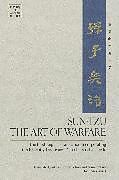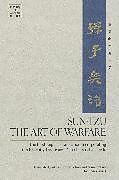Sun-Tzu Art of Warfare
Einband:
Fester Einband
EAN:
9780345362391
Untertitel:
The First English Translation Incorporating the Recently Discovered Yin-ch'ueh-shan Texts
Genre:
Übrige Sachbücher & Sonstiges
Autor:
Ames Sun-Tzu
Herausgeber:
BALLANTINE BOOKS
Auflage:
New
Anzahl Seiten:
336
Erscheinungsdatum:
02.03.1993
ISBN:
034536239X
Informationen zum Autor Roger T. Ames is a professor of Chinese philosophy at the University of Hawaii, and the director of its Center for Chinese Studies. He is also editor of the journals Philosophy East & West and China Review International . He is the author of several interpretative studies on classical Confucianism, including Thinking Through Confucius (with David L. Hall). His earlier translation of Sun-Tzu: The Art of Warfare is recognized as a landmark of contemporary Chinese military and philosophical studies. Klappentext The most widely read military classic in human history, newly translated and revised in accordance with newly discovered materials of unprecedented historical significance. Fluid, crisp and rigorously faithful to the original, this new text is destined to stand as the definitive version of this cornerstone work of Classical Chinese. Of compelling importance not only to students of Chinese history and literature, but to all readers interested in the art or the philosophy of war.INTRODUCTION THE NEW SUN-TZU The Sun-tzu, or Master Sun, is the longest existing and most widely studied military classic in human history. Quite appropriately, it dates back to the Warring States period (c. 403-221 B.C.), a formative phase in Chinese civilization when contributions in literature and philosophy were rivaled in magnitude and sophistication only by developments in an increasingly efficient military culture. Over the course of the preceding Spring and Autumn period (c. 722-481 B.C.), scores of small, semiautonomous states had joined in an ongoing war of survival, leaving in its wake only the dozen or so central states (chung-kuo) from which present-day China takes its actual Chinese-language name.1 By the fifth century B.C., it had become clear to all contenders that the only alternative to winning was to perish. And as these rivals for the throne of a unified China grew fewer, the stakes and the brutality of warfare increased exponentially. During this period, warfare was transformed from a gentlemanly art to an industry, and lives lost on the killing fields climbed to numbers in the hundreds of thousands. Itinerant philosophers toured the central states of China, offering their advice and services to the contesting ruling families. Along with the Confucian, Mohist, and the Legalist philosophers who joined this tour was a new breed of military specialists schooled in the concrete tactics and strategies of waging effective warfare. Of these military experts, history has remembered best a man named Sun Wu from the state of Wu, known honorifically as Sun-tzu or Master Sun. A major reason why Master Sun has remained such a prominent force in the military arts is the military treatise Sun-tzu: The Art of Warfare (Sun-tzu ping-fa), that came to be associated with his name early in the tradition. Over the centuries, a library of commentaries has accrued around the text, and it has been translated into many, if not most, of the world's major languages. Although there are several popular English translations of the Sun-tzu, several of which are discussed below, there are reasons why a new translation and study of the text is necessary at this time. The Sun-tzu offered here in this Classics of Ancient China series differs markedly from previous editions in several important respects. In 1972 a new text of the Sun-tzu was uncovered in an archaeological find in Shantung province, containing not only large sections of the thirteen-chapter work that has come down to the present day, but also portions of five lost chapters of the Sun-tzu. All of these materials, previously unavailable to the student of the Sun-tzu text, were entombed as burial items sometime between 140 and 118 B.C. This archaeological discovery means several things. The English trans...
Autorentext
Roger T. Ames is a professor of Chinese philosophy at the University of Hawaii, and the director of its Center for Chinese Studies. He is also editor of the journals Philosophy East & West and China Review International. He is the author of several interpretative studies on classical Confucianism, including Thinking Through Confucius (with David L. Hall). His earlier translation of Sun-Tzu: The Art of Warfare is recognized as a landmark of contemporary Chinese military and philosophical studies.
Klappentext
The most widely read military classic in human history, newly translated and revised in accordance with newly discovered materials of unprecedented historical significance.
Fluid, crisp and rigorously faithful to the original, this new text is destined to stand as the definitive version of this cornerstone work of Classical Chinese. Of compelling importance not only to students of Chinese history and literature, but to all readers interested in the art or the philosophy of war.
Leseprobe
INTRODUCTION
THE “NEW” SUN-TZU
The Sun-tzu, or “Master Sun,” is the longest existing and most widely studied military classic in human history. Quite appropriately, it dates back to the Warring States period (c. 403-221 B.C.), a formative phase in Chinese civilization when contributions in literature and philosophy were rivaled in magnitude and sophistication only by developments in an increasingly efficient military culture.
Over the course of the preceding Spring and Autumn period (c. 722-481 B.C.), scores of small, semiautonomous states had joined in an ongoing war of survival, leaving in its wake only the dozen or so “central states” (chung-kuo) from which present-day “China” takes its actual Chinese-language name.1 By the fifth century B.C., it had become clear to all contenders that the only alternative to winning was to perish. And as these rivals for the throne of a unified China grew fewer, the stakes and the brutality of warfare increased exponentially.
During this period, warfare was transformed from a gentlemanly art to an industry, and lives lost on the killing fields climbed to numbers in the hundreds of thousands. Itinerant philosophers toured the central states of China, offering their advice and services to the contesting ruling families. Along with the Confucian, Mohist, and the Legalist philosophers who joined this tour was a new breed of military specialists schooled in the concrete tactics and strategies of waging effective warfare. Of these military experts, history has remembered best a man named Sun Wu from the state of Wu, known honorifically as “Sun-tzu” or “Master Sun.”
A major reason why Master Sun has remained such a prominent force in the military arts is the military treatise Sun-tzu: The Art of Warfare (Sun-tzu ping-fa), that came to be associated with his name early in the tradition. Over the centuries, a library of commentaries has accrued around the text, and it has been translated into many, if not most, of the world’s major languages.
Although there are several popular English translations of the Sun-tzu, several of which are discussed below, there are reasons why a new translation and study of the text is necessary at this time. The Sun-tzu offered here in this Classics of Ancient China series differs markedly from previous editions in several important respects.
In 1972 a new text of the Sun-tzu was uncovered in an archaeological find in Shantung province, containing not only large sections of the thirteen-chapter work that has come down to the present day, but also portions of five lost chapters of the Sun-tzu. All of these materials, previously unavailable to the student of the Sun-tzu text, were entombed as burial items sometime between 140 and 118 B.C.
This archaeological discovery means several things.
The English…

Leider konnten wir für diesen Artikel keine Preise ermitteln ...
billigbuch.ch sucht jetzt für Sie die besten Angebote ...
Die aktuellen Verkaufspreise von 5 Onlineshops werden in Realtime abgefragt.
Sie können das gewünschte Produkt anschliessend direkt beim Anbieter Ihrer Wahl bestellen.
Loading...
Die aktuellen Verkaufspreise von 5 Onlineshops werden in Realtime abgefragt.
Sie können das gewünschte Produkt anschliessend direkt beim Anbieter Ihrer Wahl bestellen.
| # | Onlineshop | Preis CHF | Versand CHF | Total CHF | ||
|---|---|---|---|---|---|---|
| 1 | Seller | 0.00 | 0.00 | 0.00 |
